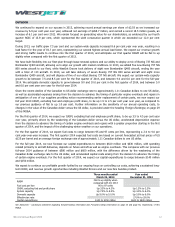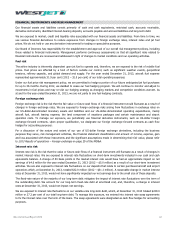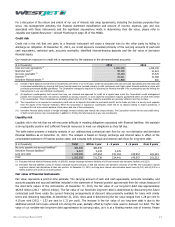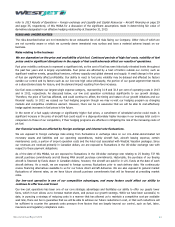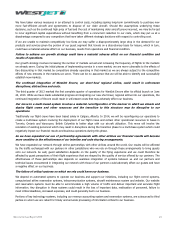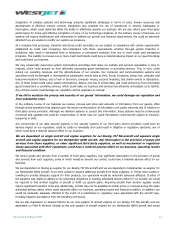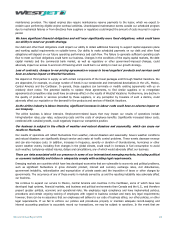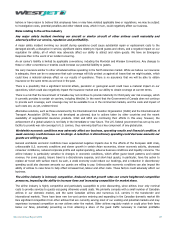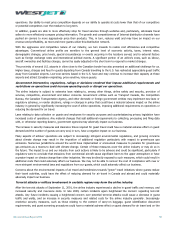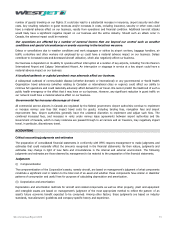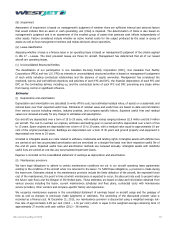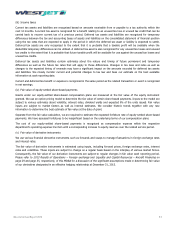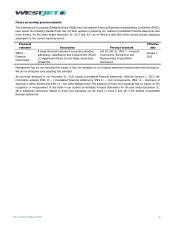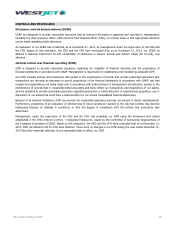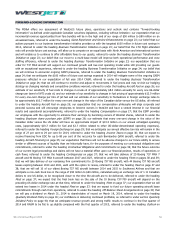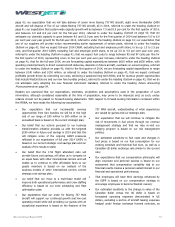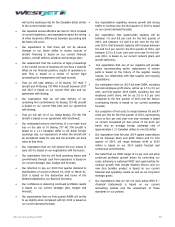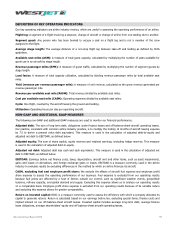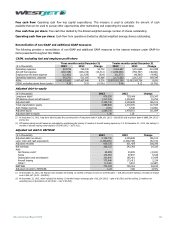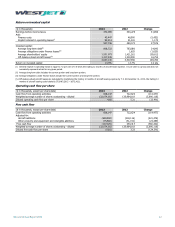Westjet 2013 Annual Report Download - page 51
Download and view the complete annual report
Please find page 51 of the 2013 Westjet annual report below. You can navigate through the pages in the report by either clicking on the pages listed below, or by using the keyword search tool below to find specific information within the annual report.
WestJet Annual Report 2013 51
number of guests traveling on our flights. It could also lead to a substantial increase in insurance, airport security and other
costs. Any resulting reduction in guest revenues and/or increases in costs, including insurance, security or other costs could
have a material adverse effect on our business, results from operations and financial condition. Additional terrorist attacks
would likely have a significant negative impact on our business and the airline industry. Should such an attack occur in
Canada, the adverse impact could be material.
Our operations are affected by a number of external factors that are beyond our control such as weather
conditions and special circumstances or events occurring in the locations we serve.
Delays or cancellations due to weather conditions and work stoppages or strikes by airport workers, baggage handlers, air
traffic controllers and other workers not employed by us could have a material adverse impact on our business. Delays
contribute to increased costs and decreased aircraft utilization, which also negatively affect our business.
Our business is dependent on its ability to operate without interruption at a number of key airports, including Toronto Pearson
International Airport and Calgary International Airport. An interruption or stoppage in service at a key airport could have a
material adverse impact on our business.
A localized epidemic or a global pandemic may adversely affect our business.
A widespread outbreak of communicable disease (whether domestic or international) or any governmental or World Health
Organization travel advisories (whether relating to Canadian or international cities or regions) could affect our ability to
continue full operations and could materially adversely affect demand for air travel. We cannot predict the likelihood of such a
public health emergency or the effect that it may have on our business. However, any significant reduction in guest traffic on
our network could have a material adverse effect on our business.
Governmental fee increases discourage air travel.
All commercial service airports in Canada are regulated by the federal government. Airport authorities continue to implement
or increase various user fees that impact travel costs for guests, including landing fees, navigation fees and airport
improvement fees. Airport authorities generally have the unilateral discretion to implement and adjust such fees. The
combined increased fees, and increases in rents under various lease agreements between airport authorities and the
Government of Canada, which in many instances are passed through to air carriers and air travelers, may negatively impact
travel, in particular, discretionary travel.
ACCOUNTING
Critical accounting judgments and estimates
The preparation of consolidated financial statements in conformity with IFRS requires management to make judgments and
estimates that could materially affect the amounts recognized in the financial statements. By their nature, judgments and
estimates may change in light of new facts and circumstances in the internal and external environment. The following
judgments and estimates are those deemed by management to be material to the preparation of the financial statements.
Judgments
(i) Componentization
The componentization of the Corporation’s assets, namely aircraft, are based on management’s judgment of what components
constitute a significant cost in relation to the total cost of an asset and whether these components have similar or dissimilar
patterns of consumption and useful lives for purposes of calculating depreciation and amortization.
(ii) Depreciation and amortization
Depreciation and amortization methods for aircraft and related components as well as other property, plant and equipment
and intangible assets are based on management’s judgment of the most appropriate method to reflect the pattern of an
asset’s future economic benefit expected to be consumed. Among other factors, these judgments are based on industry
standards, manufacturers’ guidelines and company-specific history and experience.


